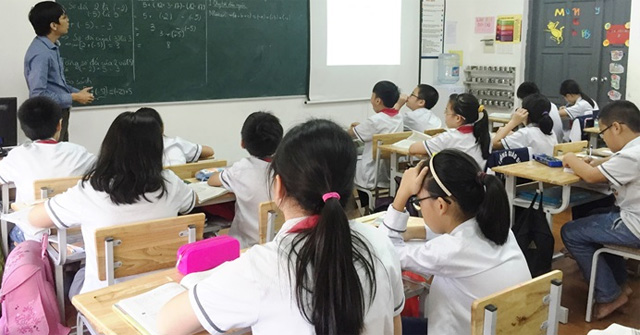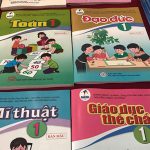Bài tập tiếng Anh lớp 8 theo từng Unit, Tài Liệu Học Thi xin giới thiệu đến các em tài liệu Bài tập tiếng Anh lớp 8 theo từng Unit. Chúc các em học và đạt được kết quả
Tài Liệu Học Thi xin giới thiệu đến quý thầy cô cùng các em học sinh cùng tham khảo tài liệu Bài tập tiếng Anh lớp 8 theo từng Unit được chúng tôi tổng hợp chi tiết và đăng tải ngay sau đây.
Tài liệu bao gồm 91 trang, tổng hợp các dạng bài tập của từng bài nhằm giúp các em học sinh lớp 8 ôn tập lại hệ thống kiến thức tiếng Anh, đồng thời rèn luyện kỹ năng làm bài và quản lý thời gian. Sau đây là nội dung chi tiết, mời các em cùng tham khảo và tải tài liệu tại đây.
Bài tập tiếng Anh lớp 8 theo từng Unit
Unit 1
Present simple to talk about general truths.
– We use the present simple to express general truths. For example.
+ The earth moves around the sun.
+ The moon goes round the earth.
+ The sun rises in the east and sets in the west.
+ The bear sleeps during the winter.
+ Today is Monday; tomorrow is Tuesday.
+ Fish lives in the water.
+ Water consists of main elements: Hydrogen and Oxygen
Use of “enough”.
– Enough is put before noun and after adjective. For example
+ She hasn’t enough money to buy a new house.
+ There is not enough time to finish the test.
+ There wasn’t enough room for us to sleep
+ He has enough reasons to be angry.
S + V + Enough + N + To-infinitive
Enough + N + For + O + To-infinitive
The rope is not long enough.
She isn’t old enough to drive a car.
It is not old enough for her to drive a car.
I am fool enough to trust her.
S + Be + ADJ + Enough + To-infinitive
IT + Be + ADJ + Enough + For / Of + O + To-infinitive
I. Complete the sentences with the words in the box.
| generous/ orphanage/ sociable/ planet/ next-door/ humor/ joke. |
1.The Earth is the name of the ______ we live on.
2. He has a good sense of ______. He always makes people laugh.
3.After the death of his parents, he was sent to an ________.
4.Don’t do it as a ______. It’s a serious thing.
5.She lives next to my house. She is my ______ neighbor.
6.It was _____ of you to share your food with me.
7.Mai has a lot of friends. She is very ______.
II. Arrange the adjectives in brackets in the correct order.
1. It’s a (wooden/ round) table.
2. She is wearing a (green/ new/ beautiful) dress.
3. My uncle lives in a (old/ lovely/ small) house.
4. That girl has (blue/ nice/ big) eyes.
5. He gave me (black/ leather) gloves.
6. My teacher has a (round/ pink/ small) face.
7. It’s a (small/ metal/ black) box.
III. Combine each of the following pairs of sentences into one sentence, using (not) adjective + enough + to-infinitive.
1. My sister is old. She can drive a car.
……………………………………
2. The radio isn’t small. You can’t put it in your pocket.
……………………………………
3. This coat isn’t warm. I don’t wear it in winter.
……………………………
4. She is beautiful and intelligent. She can become Miss World.
………………………………
5. The weather was fine. We could go camping.
………………………………
6. Those apples aren’t ripe. We can’t eat them.
………………………………
7. Mr. Robinson isn’t rich. He can’t buy a house.
………………………………
8. The worker is clever. He can make fine things from wood.
………………………………
IV. Put the verbs in brackets into the correct form or tense.
1. She ______ (not/ drink) coffee. She ______ (drink) Coca Cola.
2. It _______ (be) often hot in the summer.
3. What _______ you ______ (do) every evening?
4. The earth _______ (circle) the sun once every 365 days.
5. I ______ (see) her very often.
6. Most rivers _______ (flow) into the sea.
7. Vegetarians ______ (not/ eat) meat.
8. Bees _____ (make) honey.
9. Rice ______ (not/ grow) in cold climates.
10. Where _____ Martin ______ (come) from? – He _____ (be) Scottish.
11. The sea _____ (cover) two-third of the world.
……………….
Unit 2
1. Be going to : dự định
* We use “be going to” to express plans or intentions in the near future, it is sure to happen. For example
We are going to practice piano for two hours this evening.
She is going to travel abroad tomorrow.
* We also use “ be going to ” to predict. For example
Oh, look ! it is going to rain. Look out, she is going to faint.
They are going to be married next May.
S + Be (am/is/are) + going to + Bare infinitive
. Adverbs of place.
* We use adverbs of place to show the direction or position of people or things.
For example
He is not outside; Maybe he is inside.
They do not play football here; perhaps, they play there.
She is not upstairs; it is possible that she is downstairs.
Outside: bên ngoài
Inside: bên trong
Here: ở đây
There : ở đó
Upstairs: ở trên lầu
Downstairs: ở dưới lầu
I. Write sentences. Say what the people are going to do.
1. My uncle has won some money. (buy a new car)
……………………………………
2. They received a wedding present from their pen pal friend, Nick. (write a letter to thank him)
………………………………………
3. I’ll have an annual holiday next month. (visit Ha Long Bay)
………………………………………
4. My father has a bad cough. (stop smoking)
………………………………………
5. Linh is studying medicine. (be a doctor)
……………………………………
6. We have bought some bricks. (build a garage)
………………………………
7. The windows are dirty and Mai’ll be free this afternoon. (clean the windows)
………………………………
8. Jane and Lan have decided to have a party. (invite lots of people)
…………………………………
II. Put the verbs in brackets into the correct form or tense.
1. Bad driving ________ (cause) many accidents.
2. Nga and Lan ________ (see) a movie tonight.
3. Sue can _________ (speak) Vietnamese very well.
4. Mozart _________ (write) more than 600 pieces of music.
5. ‘How _______ you _______ (learn) to drive?’ ‘My father ______ (teach) me.
6. We usually ______ (go) to the library three times a week, but last week we _______ (go) twice.
7. Alexander Graham Bell _______ (introduce) the telephone in 1876.
8. Yesterday I _______ (be) busy, so I _______ (not/ have) time to phone you.
9. ‘What _______ you _______ (do) next summer vacation?’
‘I _______ (visit) my grandparents in Nha Trang.
10. Would you like ______ (come) to dinner tomorrow?
………….
Unit 3
I. Fill in the blanks with the suitable verbs in the correct form.
| sweep/ feed/ rub/ empty/ dust/ tidy/ cook/ wash |
1. My mother _____ the furniture everyday.
2. She ____ the garbage two days ago.
3. Would you like to come for dinner? I ______ a hearty dinner tonight.
4. He _____ the rugs last Sunday.
5. They _____ the dishes now.
6. You’d better _____ your room before your mother arrives.
7. What ____ you usually _____ your dog on?
8. Mai ____ the kitchen floor yesterday evening.
II. Complete the sentences with must or have/ has to.
1. Vietnamese children ____ wear uniform when they come to school
2. Last night my sister was ill. We _____ call the doctor.
3. I have bad toothache. I ____ make an appointment with the dentist.
4. I don’t want ____ wait in a queue for ages.
5. She ____ work on Saturday morning.
6. When you come to California, you ____ come and see us soon.
7. This is a terrible party. We ____ go home.
8. If there are no taxis, we’ll _____ walk.
9. Daniel ____ go to the bank. He hasn’t any money.
10. You really ____ hurry up, Vicky. We don’t want to be late.
III. Fill in the blanks with mustn’t or don’t/ doesn’t have to.
1. They ____ work on Saturday.
2. Visitors ____ feed the animal.
3. Tim ____ wear uniform at school.
4. You _____ touch that switch. It’s very dangerous.
5. Don’t make so much noise. We _____ wake the baby.
6. There’s a lift in the building, so I _____ climb the stairs.
7. Staff _____ smoke when serving customers.
8. Sally is extremely rich. She _____ work.
IV. Give advice with ought to or ought not to.
1. Minh looks very tired. (go to bed late)
…………………………………
2. My parents are going to visit France. (learn a few French words)
…………………………………
3. It’s eight o’clock. Helen is still sleeping. (get up earlier)
…………………………………
4. There is traffic jam and the people are rushing forward. (drive like that)
…………………………………
5. Nam is going to have final exam tomorrow morning. He is playing computer games now. (play computer games – learn the lessons)
…………………………………
6. The speed limit is 30 mph, but Catherine is driving 50 mph. (drive so fast)
…………………………………
7. The street is too narrow. It’s always full of vehicles. (they/ widen this street)
…………………………………
8. I’m bored. I need a change. (go away for a few days)
…………………………………
………..
Mời các bạn tải file tài liệu để xem thêm nội dung chi tiết










